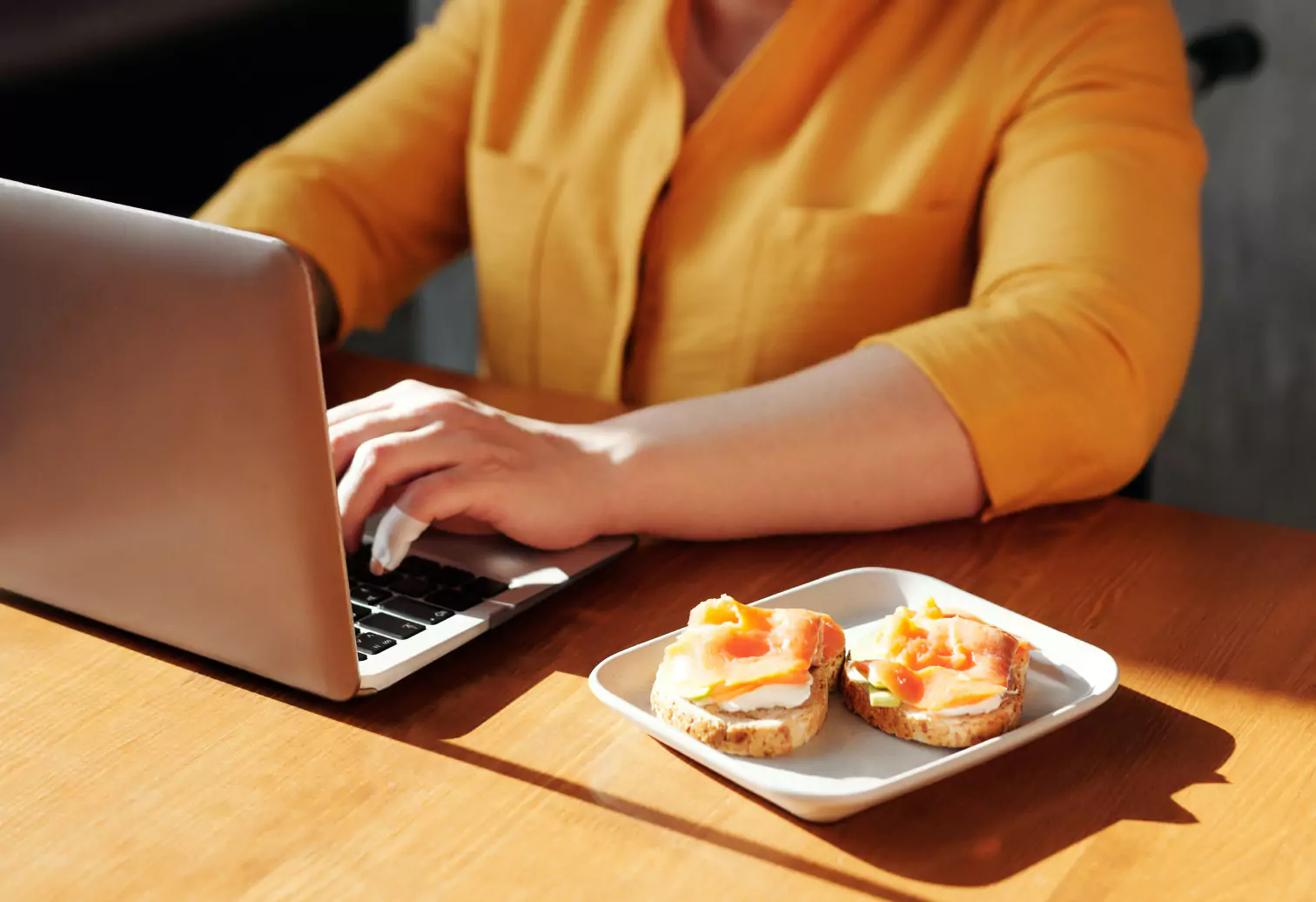8 Tips for Avoiding Weight Gain While Working From Home

Key Takeaways
Remote work is now the norm for many, and whether you're in a co-working space, a cafe, or dialing into your meetings from a beach somewhere, you can see how it's changing the landscape of the working world. If remote work for you means working from home, you already know of its benefits.
You've likely got more time for your family, flexible hours, and more time to focus on a healthier lifestyle. However, there are also downsides.
One of the major drawbacks to working from home is gaining weight because it's so much easier to be more sedentary than usual. Weight gain while working from home is very real, but overcoming it is not as difficult as you'd think to manage.
With a few simple changes to your work-from-home routine, you can get back to staying fit and healthy regardless of where you prefer to work from—even if it's in your bedroom! Read on to find out more.
Reasons People Gain Weight While Working From Home

Maintaining or losing weight is never an isolated event. Many factors tug at the strings, keeping everything precariously balanced. Pulling on one without adjusting others could throw the system out of sync.
Especially if you've just started to work from home, you may find that many of these factors can also cause weight gain. Here are a few reasons you may gain weight while working from home.
Living a More Sedentary Lifestyle
You are sitting down a lot more, moving about less when you work from home, and your lifestyle is much more sedentary. And as some research explains, this can account for more weight gain than a bad diet.
As a 2014 examination of national health survey results by scientists at Stanford found, inactivity, rather than eating habits, could cause an increase in incidences of weight gain.
Snacking More Often
A kitchen packed with snack foods is close at hand when you work from home. And since there’s no one watching, we make snack runs more often. It could easily add unwanted extra calories to your daily intake, leading to weight gain, especially when coupled with more sedentary living.
Skipping the Gym
Working from home means spending less time out of the house, translating to losing a little motivation to hit the gym. People worldwide exercised less, and many saw an increase in waist circumference as a result.
How to Avoid Weight Gain When Working From Home
If you’re still working from home or planning on moving to more remote work, here are a few ways to ensure that you don’t pile on the pounds.
1) Set Physical Activity Goals

Working from home involves less physical activity than going into the office. So you need to set physical activity goals to make sure you’re getting enough exercise.
The American Heart Association recommends at least 150 minutes (two-and-a-half hours) of moderate-intensity aerobic activity each week and ideally 300 minutes of total activity including at least 2 muscle-strengthening activities per week.
Pro Tip
Plan your week to include some physical activity, even if it is walking for 30 minutes each day. Set an alarm or mark your calendar to remind you to engage in some form of exercise. Most importantly, don’t give yourself a hard time if you cannot meet your physical activity goals for a particular week. A critical review on goal-setting published in Health Psychology Review suggests adjusting your goals based on the time you have, the priority of the goal, and its context.
2) Drink Plenty of Water Throughout the Day

Sipping on water throughout the day takes your mind off snacking, and that’s probably why many think of it as an effective weight loss aid.
Take the findings of a small study published in the Journal of Clinical and Diagnostic Research in 2013. It showed that drinking an additional 500 milliliters of water before breakfast, lunch, and dinner decreased weight, BMI, and body fat.
Pro Tip
Drink a cup of water before breakfast, lunch, and dinner. Sip water slowly, as gulping it down may give your body mixed signals. It's so that drinking water has its desired effect: to keep your mind off eating and help you feel a little fuller before your meals.
{{rich-text-cta-wl1="/style-guide"}}
3) Eat Healthy Snacks Over Candy, Chips, or Cookies

Snacks and other junk food items are generally high in salt, sugar, and saturated fats. When you have your mind on work, it’s easy to reach for a calorie-dense junk food snack. Instead, you may be better off trying to snack on healthier items such as nuts, fruit, celery sticks, carrots, and oatmeal.
Pro Tip
Prepare your healthy snack in advance. Cook a bowl of oatmeal, cut up some fruit, or lay out a cup of mixed nuts. That makes it much easier to get a helping of healthful snacking in. However, make sure that you don’t go overboard. Keep the quantity down to a minimum. You can put a note on your snacks reminding you to eat mindfully.
4) Get Enough Sleep

Sleep deprivation leads to metabolic “grogginess.” It may not seem all that important, especially since people have been working later, according to the latest data from Microsoft.
But sleep does impact metabolic activity, which can affect weight gain. Several studies, like this one in Sleep Medicine Reviews, also tie a lack of sleep with weight gain and diabetes risk.
Pro Tip
To make sure you get good quality sleep and enough of it, try setting a rule limiting the use of devices (computers, phones, and TVs) in the hours before bedtime. The blue light they emit can interrupt sleep patterns. Another way to nod off on time is simply turning off the lights and lying down. You could do something that makes you sleepier, like reading a book.
5) Add More Protein to Your Diet

Eating meals high in protein can increase satiety, keeping you feeling full for longer. Protein can improve the blood sugar response to a meal; this is especially true for those with type 2 diabetes.
Additionally, diets higher in protein can increase the satiety of a meal, so you’re less likely to overeat. One study found that casein, the protein in milk, and pea protein, were the most effective in reducing appetite when eaten 30 minutes before a meal.
So, a milk-based snack such as Greek yogurt or a helping of roasted peas before a meal could be an excellent way to keep your weight down.
Pro Tip
One easy way to include more protein in your diet is to switch out starchy foods for proteins. For example, eating quinoa or legumes instead of rice can add protein to your meals without significantly changing your eating habits. If you don’t like quinoa, you can add a cup of Greek yogurt or even a protein shake to your breakfast meals.
6) Unglue Yourself From Your Chair

Working from home can mean little to no physical activity for some. A sedentary lifestyle has many adverse effects on health, including cardiovascular health. Still, weight gain may not be tied to sitting, specifically.
But whether or not sitting for long hours plays a role in weight gain, it's not healthy. So you should stand up, walk around, and stretch at least every two hours or so. If you have the option of using a standing desk or treadmill desk that could also be a good way to avoid sitting for too long.
Pro Tip
One easy way to make sure you unglue yourself from your chair is to drink plenty of water. That will ensure that you get up and go to the bathroom regularly when you can stretch your legs and walk around a bit. Take a regular break every hour to walk around, refresh your mind, and stretch your muscles.
7) Stick to a Routine

Achieving your weight goals could come down to sticking to a routine. It’s that important! Many people who start enthusiastically report waning focus as time goes by. You can set daily or weekly routines, but be sure to stick to them to see your weight loss goals all the way through.
For instance, you could have different healthy breakfast options each day of the week. Include a day or two of gym exercise in your weekly routine, and go to bed early each night.
Pro Tip
If a routine doesn’t seem to be working at first, change it up a bit. Not everything works for all people. Modify something that’s good but doesn’t quite work for you, and you’ll soon be extracting the most out of it.
8) Moderate Your Alcohol Consumption

A review of research findings says that light-to-moderate alcohol consumption is not associated with weight gain, but heavy drinking might be. Some alcohol is high in calories, and consuming it can interfere with your body. It can negatively influence metabolism, interrupt hormone function, and lead to poor food choices. It's always best to moderate your consumption.
Pro Tip
Plan ahead to limit your consumption: Tell yourself that you’ll only drink a certain amount and stick to it. Pace yourself while drinking: Have no more than one drink per hour and drink lots of water alongside alcohol. Don’t forget to eat: Foods high in protein can help lessen the effects of alcohol.
Find the right Nutrisense programto turn insight into progress.
Go Beyond Glucose Data with Nutrisense
Your glucose can significantly impact how your body feels and functions. That’s why stable levels are an important factor in supporting overall wellbeing. But viewing glucose isn't enough. Nutrisense, you’ll be able to learn how to use your body's data to make informed lifestyle choices that support healthy living.
One-to-one coaching
Sign up to access insurance-covered video calls to work with a glucose expert: a personal registered dietitian or certified nutritionist who will help tailor your lifestyle and diet to your goals.
Monitor and measure what matters
With the Nutrisense CGM Program, you can monitor your glucose with health tech like glucose biosensors and continuous glucose monitor (CGM)s, and analyze the trends over time with the Nutrisense App. This will help you make the most informed choices about the foods you consume and their impact on your health.
Find your best fit
Ready to take the first step? Start with our quiz to find the right Nutrisense program to help you take control.

Katie is a dietitian at Nutrisense. With over 11 years of experience as a dietitian in many areas of nutrition, Katie has worked as a clinical dietitian within a hospital, as well as in the fields of diabetes, sports and performance nutrition, recovery from addiction, and general wellness. She’s also an athlete and has run 8 marathons, including the Boston Marathon.




